
























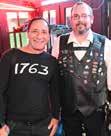

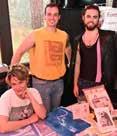




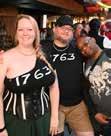
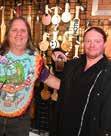
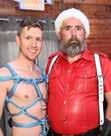
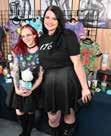




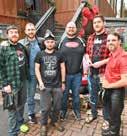


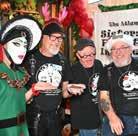

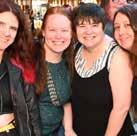


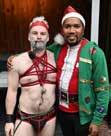



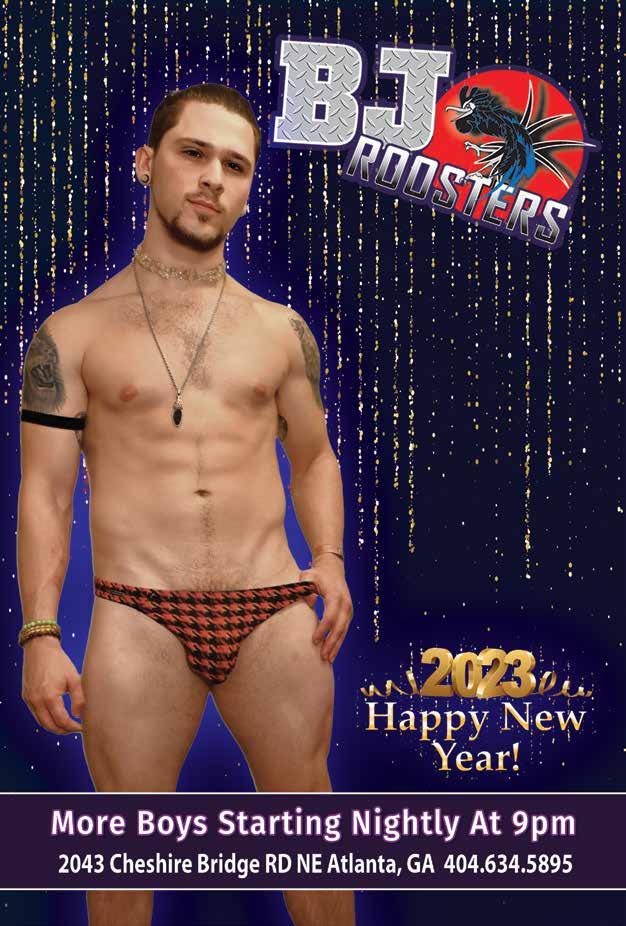






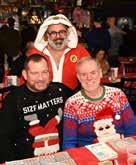
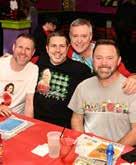

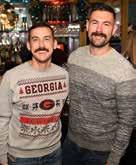


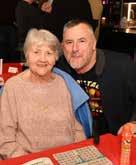


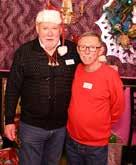

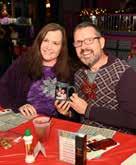
This is Ben Aldridge’s moment, and that’s no spoiler alert. The Los Angeles Times already made that call in a recent profile of the 37-yearold English actor, writing that Aldridge is “on the cusp of stardom.”
And so it seems, as Aldridge, an established London theater actor who came out publicly as gay in 2020, thrusts himself into leading-man roles in two major studio films after a recurring role in “Fleabag” and a more substantial part, as Thomas Wayne, in HBO’s “Pennyworth.”
On the big screen, the actor can currently be seen in the new romantic tragicomedy from Focus Features, director Michael Showalter’s “Spoiler Alert.” In the film, Aldridge portrays Kit Cowan, a photographer whose romantic relationship with real-life pop culture journalist Michael Ausiello, played by Jim Parsons, is suddenly challenged when he’s diagnosed with cancer (the film is based on Ausiello’s 2017 memoir of the same name).
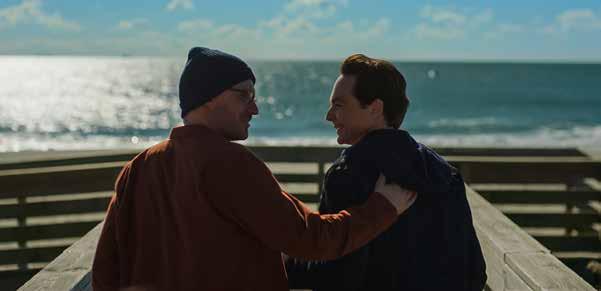
In early 2023, Aldridge will try his damnedest to survive M. Night Shyamalan’s apocalyptic horror film “Knock at the Cabin,” portraying another gay character, this time alongside “Looking” actor Jonathan Groff. Aldridge ad Groff lead the Universal Pictures project, out Feb. 3, as gay dads vacationing at a remote cabin, which ends up not being much of a vacation at all when they’re taken hostage.
From the Park Lane Hotel in New York City, Aldridge spoke about how it feels “invigorating” being a gay actor playing gay characters, his reaction to Sally Field portraying his onscreen mother and the “wave of progress” in LGBTQ-led content.
What was it like to tell such an emotional story that really happened in “Spoiler Alert”? I think exactly that. I think it was emotional. It was intense, but kind of intensely wonderful. I feel like this is the kind of acting role and piece that you dream of doing. From falling in love, to the diagnosis, to the tragedy of Kit’s passing, it’s really a full life lived over 14 years in the film.
And that’s kind of a dream come true, to be able to play someone that experiences all of that. I felt really honored, and sometimes daunted and overwhelmed, that I had been given the responsibility of telling the portion of Kit’s story in the film. It was a privilege from start to now. Still talking about it feels like a privilege.
I imagine that you and Jim had a lot of work to do between the two of you to really make this feel authentic to Michael and Kit’s story. I really felt like my performance wouldn’t have existed without Jim’s. I felt so informed by him at all times and so much empathy for them as real people. But then that kind of just concentrated itself into me feeling specific empathy for Michael and Jim playing Michael that it just really felt like everything I did was influenced by everything he did the whole time. In terms of chemistry, we just started emailing. So as soon as the film came together and I was signed on to do it, Jim emailed me and the subject header said, “Let’s start.” We just started this pen pal-ship of these long letters. Sometimes about the project, but not very often; mostly just about ourselves to get to know each other. And we’d ask each other questions about acting, maybe, but more about our lives and our partners and all sorts, really. And there was still a leap of faith in that. We were very lucky that we’ve formed a real friendship, which I think definitely helped us just to know each other and trust each other in the scenes. And I think it helped with that chemistry.
Our guide really was the material in the book and it is so detailed, and it’s so rich, and so full. It was always tethering it back to that. And Michael Ausiello was there on set as an exec and had really lived this. So I think we were just really lucky.
I read that you used Kit’s actual camera in the film, and then I wondered what kind of role Michael had in helping you portray Kit. Had he shared with you some details about Kit that brought you closer to who he was to play him?
Yeah, he did. As soon as I finished reading the book, I emailed Michael and he then emailed me back and just made himself a very open resource for anything Kit-related, him-related, relationship-related, including artifacts and specific things. It felt very powerful to hold that camera on set and to think that I was doing the thing that Kit did with it. There was something just very sacred in the object itself. Other things I asked him questions about, and that really helped me.
He has an active Kit Cowan Archives on Instagram and also his Flickr account. I’m surprised at how much that gave me an insight into the way he viewed the world. And he was a documentarian, so just very quirky observations. There’s a lot of humor in his work. The things that he captured were very specific to the way he saw the world. And Michael told me that, really, Kit’s camera was Kit making sense of the world and of himself. He also took a lot of selfies, probably in a time where not many people did, but lots of famous photographers have done that as well. I just really enjoyed poring over the photographs. They helped me in a way that I didn’t think they would.
There’s the moment where there’s this degaying of Kit’s place right before his parents come over. It’s funny because I feel like that’s relatable to every gay person. Did you relate to that particular experience?

Yeah, definitely. I think something the film does very subtly is show us the journey of… as gay people, until the moment our parents find out about our true selves, we are very used to managing their handle on the truth and what they know about us. And I think it can keep a distance between you and your parents, and certainly I could relate to that.
What happens in the film, once [Kit’s parents] Marilyn and Bob know and are accepting, there’s just such an honest exchange. I think it just deepens the parental relationship for them to really know who you are. I did really relate to that. And I think the de-gaying of the apartment, I can relate to almost de-gaying myself a little bit when going home when I was younger, and maybe potentially dressing differently or just being more conscious of that. I’m glad that element of the book is represented in the film.
I love that Kit had “Beaches.” And not just “Beaches” on DVD, but the special edition. Those DVDs are very specific. Sara K. White,
the [production] designer, [made] everything in the apartment so specific to the book. But then things outside of the book, we shared several emails back and forth about what I wanted there. Certain books and art books. If you look at all those films, they all make a lot of sense. And again, there were things of Kit’s in there. So yeah, it was very cool.
So she was attached before I became part of the conversation, before I met Michael [Showalter] and Jim. So I knew that was always the deal. But of course, I was so excited. But also definitely a healthy amount of intimidation, just to think that I would be looking into her eyes and saying lines and hoping that she believed me. And yeah, that was a good nervous energy. But it was wonderful, and I could just marvel at her.
All of us were really free to improvise and she did a lot of improvisation. And sometimes I’d be just in a scene, of course acting with her, but being a bit like, “Wow, she’s so amazing.” And Bill [Irwin, who plays Kit’s father] too. Such wonderful actors. And they both have gay children themselves. So I think there was a real understanding and a real care. They had so much care over us and over playing parents to gay children. I just really felt that from them. They’re both wonderful in the film as well.
Was “RuPaul’s Drag Race” actually on in that scene with Sally? Did you really watch “Drag Race” with Sally Field?
Definitely knew we were watching “Drag Race.” I can’t remember if it was actually on the screen. Because there’s a funny thing about actually playing stuff [on TVs] and filming, so I don’t know. But we definitely knew we were watching it. But also, Kit at that moment is so almost in and out of consciousness. It was a really special moment because, I mean, I never watched “Drag Race” with my parents, and I wonder if they would understand it or not. But I just love that in our story that they sat down with their parents. It was just a really nice moment, cuddled up next to Sally Field. There was something really tender and gentle about [that].
Is this your first gay character? No. I played a gay character on stage in a play called “The Lyons” in my 20s. And then I had done a UK detective series [“The Long Call”] just before filming this where it was apparently the first ever gay detective on UK screens. But yeah, that was very, very personal. I’m not a detective, but it really reflected my own life. And it’s been really nice over the last three years, and something I’ve craved and wanted to do is to play people that I really identify with. My 20s [as an actor] was about escaping. I was playing lots of straight romantic parts, which I love doing. But it was about escaping something. I think more recently I’ve wanted to do a deeper dive on myself and meet myself in the projects that I’m doing and really emotionally understand. We’re in a wave of progress where there’s more quick content, and I feel really
excited and privileged to be getting to play these characters.

To see your identity reflected in these characters on screen in kind of a big way, what does that mean to you?
Yeah, it’s a very personal experience. It’s strangely relieving to be on a set and being witnessed by a crew. It kind of feels like taking your skin off a little bit and being the most unguarded you’ve ever been. Even though you are still playing something, it feels invigorating, it feels life-affirming, it feels emboldening. And as someone who really struggled with their identity and a lot of shame in my teenage years and throughout my 20s, there is something... I feel very privileged to be doing it. And I feel like I’m part of riding a wave of progress. And I’m very pleased to be there and really glad that we’re getting more stories about ourselves that are not just connected to tragedy in the way that we’ve been represented before.
Love is at the center of [this] film. And yes, tragedy strikes, but it’s a real story that really happened. We’re not immune to the reality of life. What we should be calling for is real reality and real stories about us. And that also should contain the spectrum and the breadth and diversity of our community as well.

This interview has been condensed and edited for clarity.
Chris Azzopardi is the Editorial Director of Pride Source Media Group and Q Syndicate, the national LGBTQ+ wire service. He has interviewed a multitude of superstars, including Cher, Meryl Streep, Mariah Carey and Beyoncé. His work has also appeared in The New York Times, Vanity Fair, GQ and Billboard. Reach him via Twitter @chrisazzopardi.
By Mikkel Hyldebrandt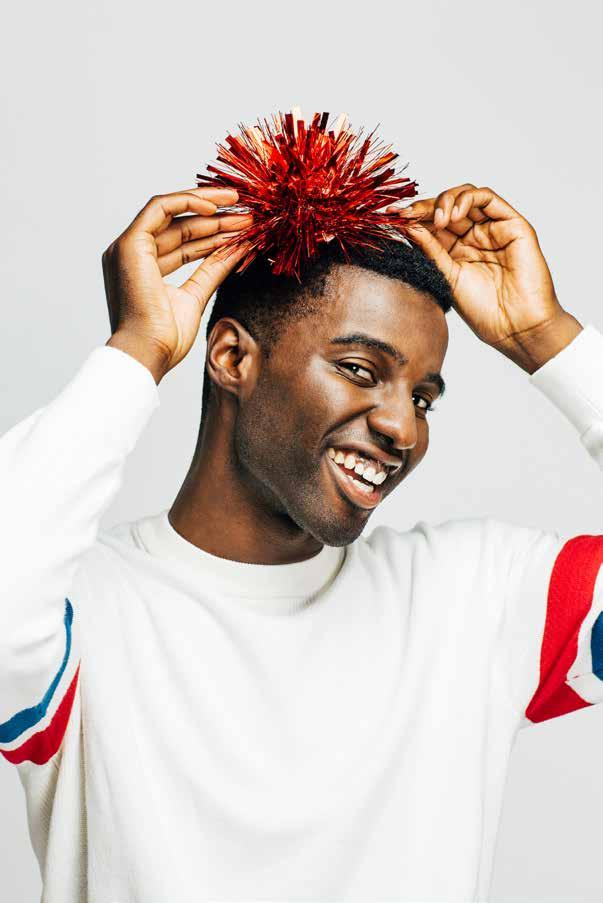
The holidays are a wonderful time to spend with friends and family. But the holidays can also be difficult if you are dealing with family tensions and odd friendship dynamics that seem even more prevalent come the holiday season. So, here are a few strategies so you can thrive, not just survive all the holiday cheer.
You have to embrace the fact that you are not in control of those around you – just as they are not in control of you. You don’t have the power to change the behavior of family members or friends, so why not put some work into accepting the ways that people are, their strengths, faults, and all.
Sure, those biding questions about your personal life can be highly triggering, but instead of buying into what could set you off, consider avoiding a potential confrontation. Sometimes taking control of your emotions is the most powerful thing you can do when faced with a provoking situation – and if it gets too much, remove yourself from the situation while gently reminding them that their behavior is unacceptable.
It pays to identify who in your family and friends circle cause you distress and then set a few boundaries before the holiday get-together. They don’t have to be set with the person(s)

directly, but you could make sure you avoid specific topics of conversation or don’t sit next to them at dinner. The important thing is that you set these boundaries so that you can better appreciate what your family and friends have to offer.
Sometimes family relationships don’t offer you the support and even affection you need, so seek out those in your social life that do. You will get the love and support you need and an opportunity to debrief and unpack your emotions. Maybe a fresh perspective or just the chance to vent a little will help any lingering feelings dissipate before they develop into something more.
Mindfulness and forcing yourself to view things and dynamics through a different lens can help you balance any uncomfortable emotions. Pay attention to what you love and appreciate about the people around you, and use your senses to enjoy the food and drink. When you focus your thoughts even a little, your mind won’t be distracted, and you can make way for humor and a lighter mood.

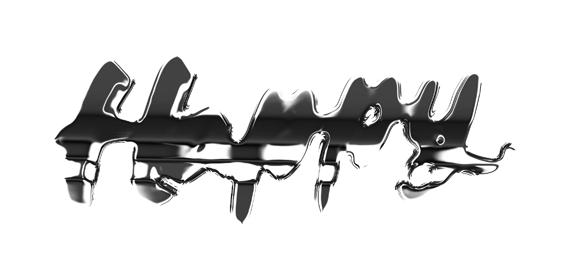
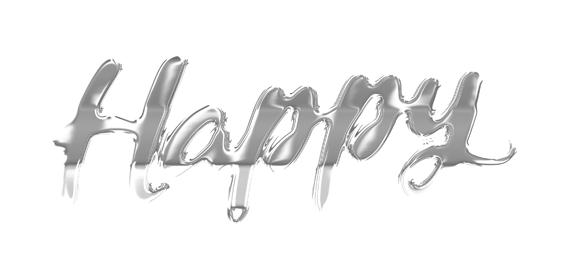
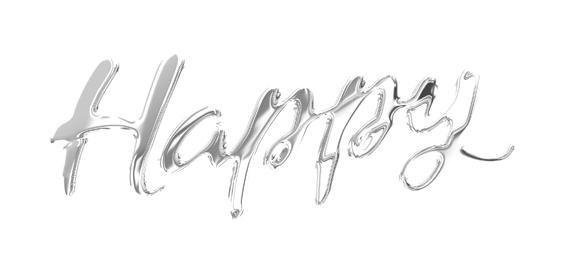

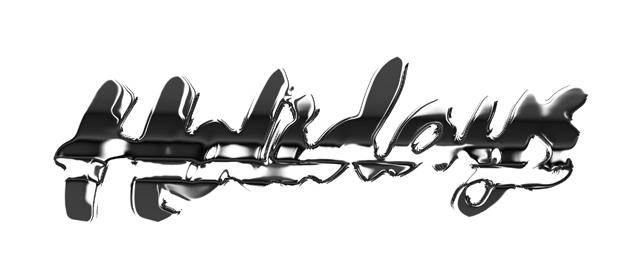
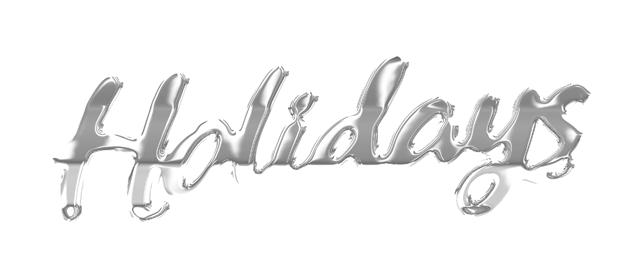

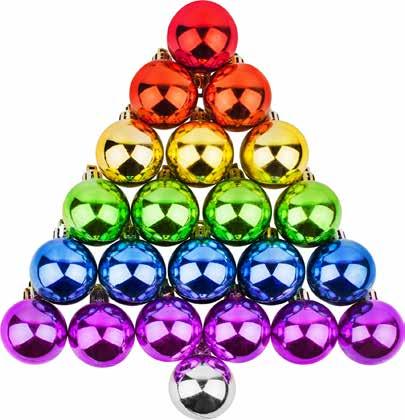
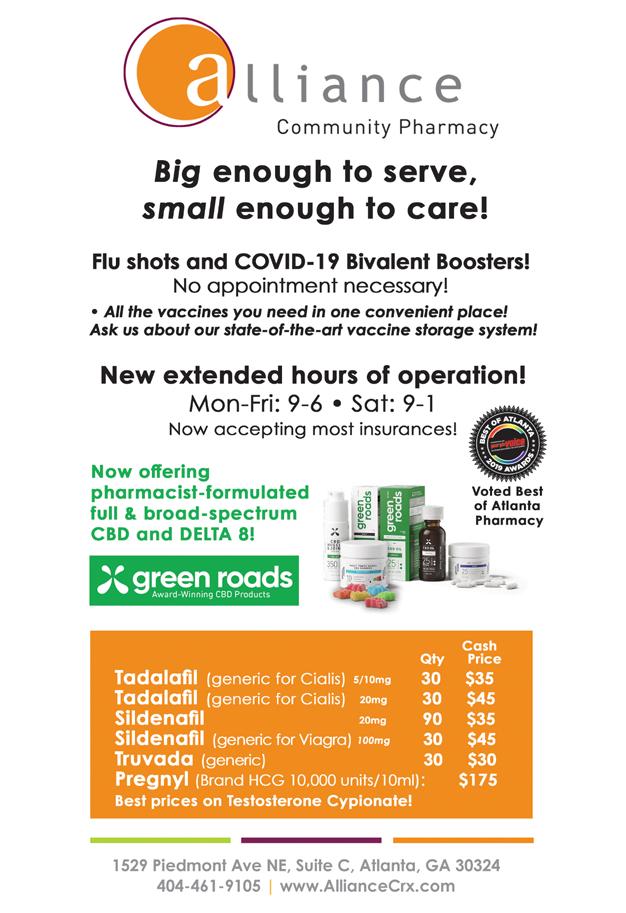
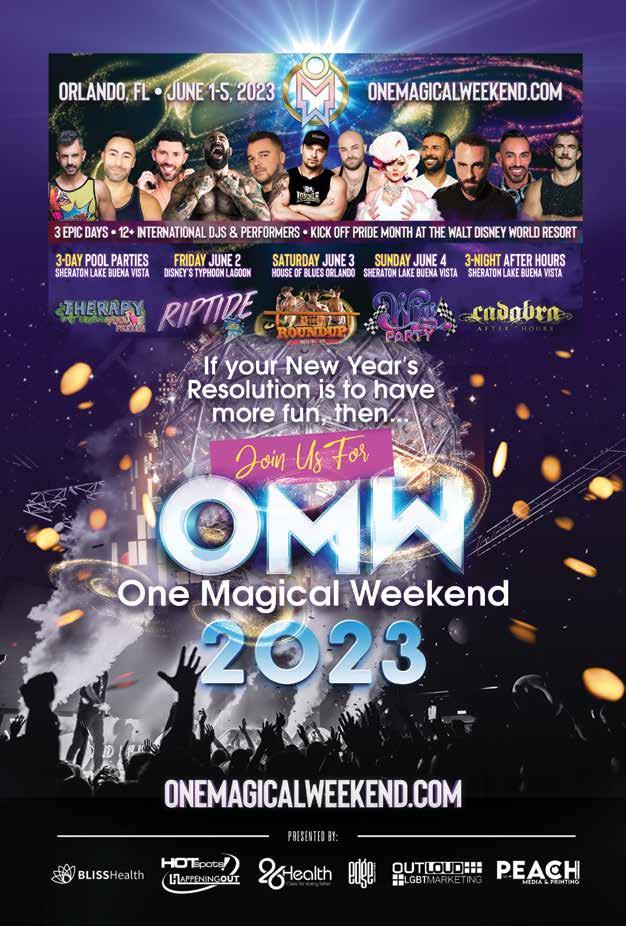

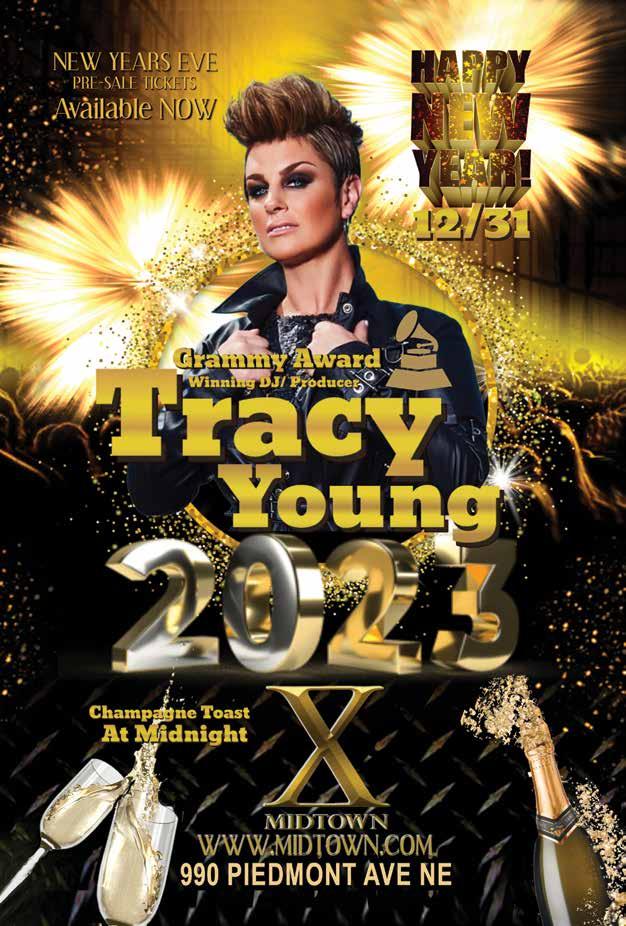
When Brendan Fraser’s character Charlie first appears in director Darren Aronofsky’s new film “The Whale,” he is masturbating to gay porn. Shown first as an anonymous shape sitting on a couch, Charlie is circled by the camera tentatively, as if it’s afraid to approach him too quickly, a reticence that is hard to distinguish as a fear of what Charlie is doing or a fear of what Charlie is.
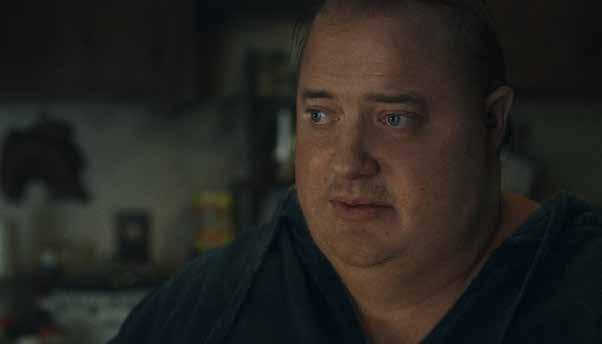
Regardless, a fear it is, in a film where the dominant emotion alternates between slightly removed shock and condescending sympathy. But this entanglement at the center of the film’s representation leads one to ask: gay or fat, what’s the “shocker” here? Which one is shocking, and which one is the provenance of patronizing faux concern?
Charlie weighs roughly 600 pounds, we are told in the film, and in his physical condition is largely housebound, confined to a small apartment in Idaho where he teaches a writing composition class online. The entirety of the film takes place inside this apartment, a sign of its origins as a play. It’s a device intended to place the viewer in Charlie’s solitary life, interrupted intermittently by visits from his best friend and unofficial nurse Liz (Hong Chau), his estranged daughter Ellie (Sadie Sink), ex-wife (Samantha Morton), and a Mormon missionary (Ty Simpkins).
“The Whale” has attracted publicity and interest as a comeback vehicle for Fraser, a heartthrob in the ’90s and early 2000s who has since faded from stardom. What has acquired less media attention is the film’s notability as the rare film — one privileged to have a great deal of film festival buzz, a major Oscar-nominated director, and a boutique distributor in A24 — to focus on the life of a fat gay man, potentially opening up a community to media representation that often lacks it.
I can’t be alone in facing this kind of representation with fear. When you’re a person of one or several minoritarian identities, seeing a film or television show allegedly “about” someone like you can be a discomforting process of coming face to face with how you are seen in the imaginations of
others. Any excitement you had to “feel seen” stands to be outweighed by the disappointment of finding loaded misrecognitions in its place.
Unfortunately, my experience watching “The Whale” was more of the latter. There I sat in the theater, one whale watching another, hoping to find just a trace of connection between the two of us. Instead Fraser’s Charlie, in a fat suit and layers of prosthetic makeup, feels overcome by the baggage of a world doubly homophobic and tyrannically favoring thin body shapes, rendering the actual lived reality of a fat gay man somewhat sketchy and unconvincing, his consciousness written by belief systems that seek to destroy him.
As a fumbling, awkward teenager, much of my life was defined by keeping my queer sexuality a secret at all costs, scared enough of the straight world around me that, even without a direct threat of physical violence to me personally, I simply couldn’t imagine what a livable queer adulthood would look like. I was in an uneasy purgatory adolescence, seemingly awaiting nothing but gay hell (incidentally, great nightclub idea).
An image that sticks out to me now is from the TV series “Glee,” the first season of which aired in my senior year of high school, when the closet was becoming truly unlivable and I was starting to stick limbs out of it in a confused, furtive panic. Chris Colfer’s character, the young, starchy twink Kurt Hummel, was living a queer life, in all its challenges and pain, as well as its joys and validations.
The show was allegedly inspiring people — theoretically this could have provided a life raft for a young queer! But I looked at Kurt — trim, fashionable, small, cute — and I saw only new layers of blockages that prevented me from imagining a queer life. Sure, someone like Kurt could be gay. So could the fleeting other images I saw — predominantly white men, if not small and twinky like Kurt then chiseled and muscular with an athletic physique, like the pack of men on “Queer as Folk.” But my body, my fatness,
seemingly prevented me from finding a legible queer identity. My self-love and healthy self- image has soared since, but the vulnerabilities of queer adolescence are grave and formative.
Brendan Fraser played the kind of beefcake beauty I felt impossibly distant from in the 1998 film “Gods and Monsters,” a biopic of the gay 1930s horror filmmaker James Whale — another gay whale! — deliciously played by Ian McKellen. Fraser’s character Clayton Boone, Whale’s gardener, is certainly curious about his boss’s taboo flirtatiousness with him, when the film’s 1950s setting makes such flirtation criminal. Throughout the film we see Clayton re-conceptualizing his own physicality through Whale’s eyes, learning a new rhetoric of his own desirability that begins to excite him. I wish this openness to being desired existed for Fraser some 25 years later.
Fraser’s casting in “The Whale” — and his own body’s changes, not to the extent of 600 pounds but still weight beyond what mainstream Hollywood finds acceptable in a leading man — lends precious poignancy to the film, buoyed by Fraser’s sparkly eyes and light charisma evocative of his time as himbo par excellence in “George of the Jungle.” I do believe that Fraser, who came forward as a victim of sexual assault in 2018, has a deep and sincere awareness of the troubled politics of existing in a body in this world, as it changes through different shapes of variable desirability, and as it is exposed to violence.
But Charlie the character’s body rarely coheres as a lived-in body on screen at all, and it’s not just because of the hotly debated fat suit. Sweat stains on his shirts look more like aestheticized ink blots than the signs of a real, sweating person. When the film shows its cards as a story of depression and grief, Charlie’s obesity a manifestation of his negative emotions, it begins to feel jarringly vague, the man more of a metaphor with arms and legs than a human.
What realities are left unexplored when fat bodies like his stand as signposts for ideas rather than the bearers of complicated lives? The film is at its best when it slows down to capture Charlie’s daily routines, taking note of the difficulties a man of his size encounters, and the strategies he’s employed to get around them. Otherwise, “The Whale” resorts to an assemblage of slurring wet mouth sounds as we watch Charlie eat. Overwrought music cues emphasize how very pathetic the poor man is, living out a hopeless life both shocking and saddening.
Charlie is characterized as a saint and martyr, passively taking the beating of a brutal life. Not every film needs to be a story of joy — certainly people both queer and morbidly obese have more than their full share of tragedies that are worth exhuming and processing through storytelling. But the one-note nature of the film crafts a very limited picture of what the filmmakers think a body like Charlie’s is even capable of feeling.
The ticking clock generating tension in “The Whale” is a health emergency. Charlie’s showing signs of congestive heart failure, with a deeply troubling blood pressure ratio. Despite all this, Charlie refuses to go to a hospital. The reasons for this refusal eventually become clear as part of the film’s soap opera plotting, revolving around interpersonal secrets hidden and revealed, in a perfect example of the film’s failure to generate meaning and nuance out of Charlie’s identities as both a fat and gay man.
Hospitals are not neutral spaces for fat or
queer people. Frequently they are places of immense judgment and mockery. Despite efforts to change, healthcare offices for many are reminders of what kinds of bodies and sexualities are most comfortably in tune with dominant patterns of social life. Like every other fat and/or queer person I know, I have had doctors diminish unrelated health concerns due to my fatness (“You just need to lose weight”) and stumble awkwardly over my sexuality in advice about sexual health and wellness. The shame felt in medical spaces is a real danger to queer and fat populations, causing us to avoid them precisely when they are the most needed. These contexts never come up in “The Whale,” to its detriment, as they could have invested the film with the breath of true challenges and barriers facing queer and fat people in the world.
In the play upon which “The Whale” is based, scenes end with the sounds of splashing waves, in reference to the essay on “Moby-Dick” Charlie continually clings to as an example of superlative writing, and in his own existence as a large, doomed animal. Perhaps too theatrical for film, this fantastical gesture is replaced with rain pouring down on Charlie’s apartment, keeping the same water-drenched vibe, but by more realistic means. The play’s version, as small a gesture as it is, allows us to imagine just for a moment whales as figures of serenity, even grace — not aberrations incompatible with their landscape. Large, majestic creatures, the kings and queens of the oceans!
Fat gay men have spent many years, dating to at least the 1970s, if not earlier, using bears as a cultural symbol, identifying not just with their large hairiness but their cuddly appearance, an animal comparison born of affection and warmth. I wonder what this film could have been had it embraced the whale. Media’s ability to conjure new possibilities of ways to be queer in this world can and should encompass a mode of being a fat queer defined not by the fear and shock of outsider’s eyes, but an embracing of self and body. I think Charlie deserves it.
Sean M. Donovan (he/his) is a graduate student in film and media studies at the University of Michigan and a programmer for the Ann Arbor Film Festival. You can find him at @ theseanmdonovan on Twitter.


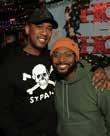
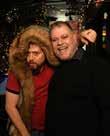
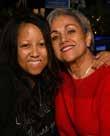


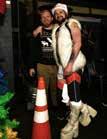







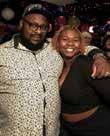

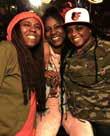
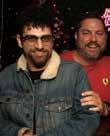

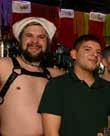
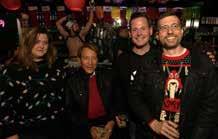
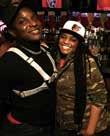
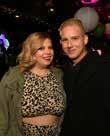
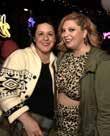


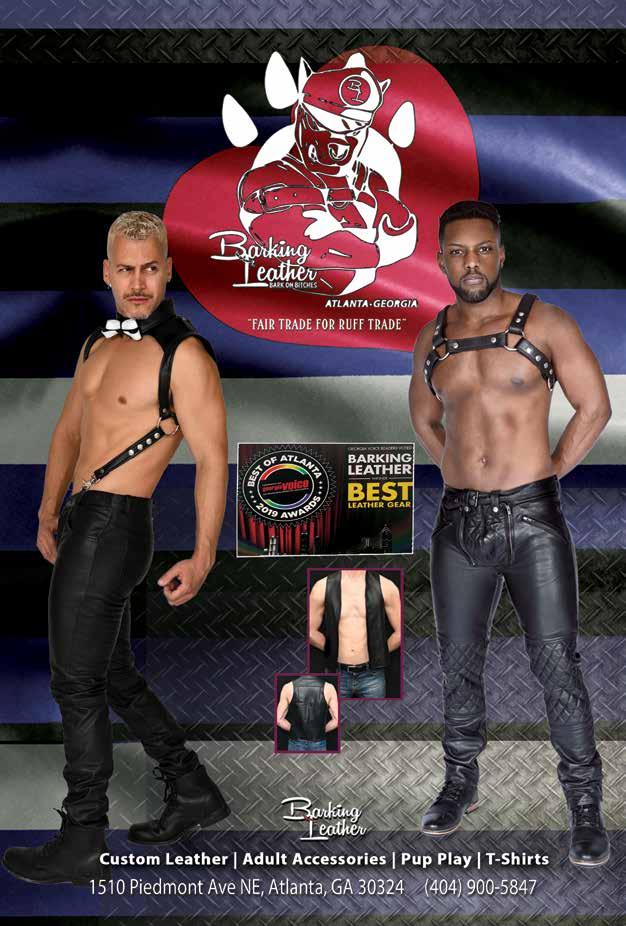
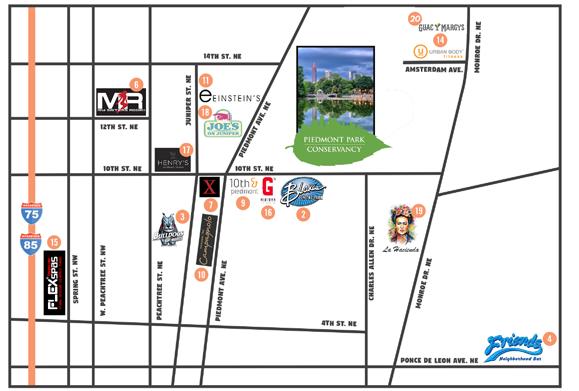




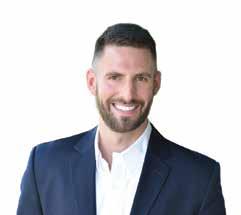




























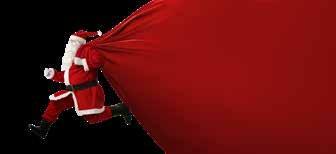


Double Scorpio, known for their, ahem, ‘VHS tape cleaner,’ has just launched their own lube. Choose between silicone- or water-based to make your gay sex even gayer.

Double Scorpio Water-Based Lube, $13 at doublescorpio.com
Keep the Schedule Sexy Stay on track with your schedules while enjoying a little eye candy. The Daddy Terry Miller Calendar keeps it sexy, kinky, and colorful with brand-new photos (and a nude centerfold!).
Terry Miller 2023 Daddy Calendar, $22 at cultureedit.com
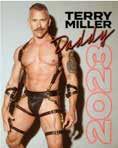
For lovers of all things meshy, these shorts are the perfect companion for the gym. Super breathable and with deep pockets in a contrasting peachcolored fabric.

Alfons Dovana Mykonos Mesh Shorts, $105 at alfonsdovana. com
Not only is this jock super comfortable with a soft, flexible elastic band, but the front codpiece in leather look is fully detachable for when the mood shifts from cuddles to caresses.
Maskulo Men’s Jock with Detachable Codpiece, $47 at maskulo.us

The classic bar vest is the perfect gift for the leather connoisseur or someone just starting their leather collection. It comes in many sizes and can be fitted at Barking Leather’s shop.
Barking Leather Bar Vest with Pockets, $150 at barkingleather. com

Baby, it may be cold outside, but it’s heating up inside! Stuff those stockings with sexy gifts that will turn up the heat and make you wish that Santa came down your chimney again and again.
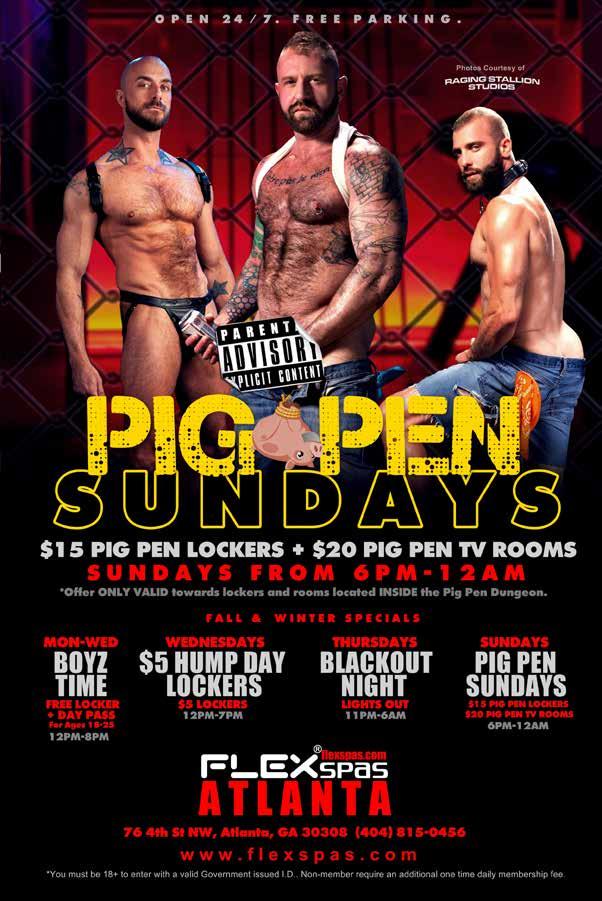
@ Buckhead Village District Daily 3-8:30 pm until December 24 Find yourself taken back to an incredible, traditional German market at this year’s Atlanta Christkindl Market, hosted this year at The Buckhead Village District.
@ 529| December 22, 9pm – 2am
A very merry goth night to all! Join an evening of revelry and Joy(Division) to the world with music by JVS and Silk Wolf and a Special Guest DJ set by Goth Dad of TikTok fame (Dusty Gannon of Vision Video).
@ The Heretic
December 23, 10 pm – 3 am
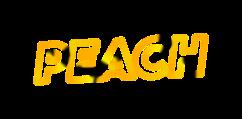



All divas, all decades, all dance. A full night of music with dance hits from all the top female artist of all time delivered to you by DJ Mike Pope.
@ Woofs Atlanta | December 23, 7 pm Wear your ugliest holiday sweater and win the contest for the worst one. $50 gift card for the best ugly sweater, $25 gift card for second place, $15 for third place. Contest entry ends at 8:30. Voting takes place at 9:00.
@ The Hideaway | December 23, 10 pm Friday Night Fetish gets merry with men with hats! Join DJ Mister Richard for a fun-filled night of beats and dancing.
Gear
@ Atlanta Eagle | December 24, 9 pm It’s the day before Christmas, so time to come sit on a bearded man’s lap and tell him if you’ve been naughty or really naughty this year.
Drag Bingo Featuring Brent Star
@ Urban Pie | December 21, 8-10 pm Urban Pie and the one and only Brent Star, a celebrated theater connoisseur, drag performer, and comedic genius, are hosting another round of Drag Bingo.






I am being left alone on Christmas – again. My boyfriend is going home to spend the Holidays with his family, and I have yet to be invited to meet his parents and family. His parents are in their 80s and have a lot of health problems, so he’s afraid that it would upset them too much. For the past three years, my Christmas has been incredibly lonely. I have practically no contact with my family, and my friends are busy with their families. I don’t know how to talk to my boyfriend about this because I’m scared that we’ll end up in a situation where I force him to choose them or me – but I feel so angry and alone! Am I terribly mean for feeling this way?
It is painful to be treated as ‘less than,’ but introducing a consequential dynamic into the relationship – them or me! – is almost never a good move. You should start a conversation about this issue where you can hopefully better understand each other’s view on the matter. He needs to understand just how rejected and lonely you feel at this time of year, and you need to have an open mind about why he chooses not to bring you - maybe he is sparing you from awful family dynamics, who knows? You may also consider building closer relationships with your friends, or maybe making new friends, so you are a little better off not relying on just one person (your boyfriend) for companionship during the holidays. Hopefully, with some honest conversation, you won’t feel as lonely this year.


